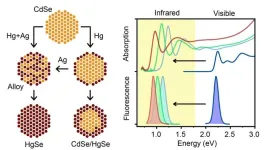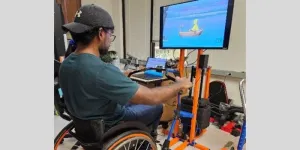(Press-News.org) The Buck Institute for Research on Aging announces the appointment of Nathan Price, PhD, to Professor and Co-Director of the Center for Human Healthspan. Price specializes in systems biology, artificial intelligence, and bioengineering. He has published more than 200 scientific papers and is co-author, with Buck Chief Innovation Officer and Distinguished Professor Lee Hood, of “The Age of Scientific Wellness.” Price has been named one of 10 Emerging Leaders in Health and Medicine by the National Academy of Medicine and is a member of the Board on Life Sciences of the National Academies of Sciences, Engineering, and Medicine.
Dr. Price is Chief Scientific Officer of the healthy aging company Thorne. Price was also a Professor and Associate Director at the Institute for Systems Biology, where he was co-director of the Hood-Price Lab for Systems Biomedicine, and an Affiliate Faculty at the University of Washington in bioengineering and computer science. He received his PhD in bioengineering from the University of California, San Diego.
“I am really excited to welcome Nathan to the Buck faculty,” says Buck President and CEO Eric Verdin, MD. “Nathan’s expertise and experience is a terrific addition as we expand our focus into the human biology arena”. Buck Distinguished Professor Lee Hood is delighted to reunite with his former lab partner. “Having Nathan here as co-director of the Center for Human Healthspan will significantly propel our efforts,” says Hood. “We have so many projects in the pipeline. I am delighted to have the opportunity to work with him again.”
“I’m thrilled to join the Buck at this time of unprecedented progress in the field of research on aging,” says Price. “The Buck’s focus on healthspan and the deep well of expertise of my new Buck colleagues in aging research were key factors in my decision to join them. With recent advancements in AI and systems biology, there is no limit to what we can accomplish together.”
About the Buck Institute for Research on Aging
At the Buck, we aim to end the threat of age-related diseases for this and future generations. We bring together the most capable and passionate scientists from a broad range of disciplines to study mechanisms of aging and to identify therapeutics that slow down aging. Our goal is to increase human health span, or the healthy years of life. Located just north of San Francisco, we are globally recognized as the pioneer and leader in efforts to target aging, the number one risk factor for serious diseases including Alzheimer’s, Parkinson’s, cancer, macular degeneration, heart disease, and diabetes. The Buck wants to help people live better longer. Our success will ultimately change healthcare. Learn more at: https://buckinstitute.org
END
Health AI expert Nathan Price joins Buck faculty
Price will also co-direct the Center for Human Healthspan
2024-07-09
ELSE PRESS RELEASES FROM THIS DATE:
Greater focus needed on how existing international law can prevent the increasing militarisation of outer space
2024-07-09
There is a pressing need for countries and international organisations to understand better how existing international law can help them address serious concerns about the militarisation of outer space, a new study says.
Space ...
Found with Webb: a potentially habitable icy world
2024-07-09
A international team of astronomers led by Université de Montréal has made an exciting discovery about the temperate exoplanet LHS 1140 b: it could be a promising "super-Earth" covered in ice or water.
When the exoplanet LHS 1140 b was first discovered, astronomers speculated that it might be a mini-Neptune: an essentially gaseous planet, but very small in size compared to Neptune. But after analyzing data from the James Webb Space Telescope (JWST) collected in December 2023 - combined with previous data from other space telescopes such as Spitzer, Hubble and ...
New one-step method to make multiple edits to a cell’s genome
2024-07-09
SAN FRANCISCO, CA—Genome editing has become a widely adopted technology to modify DNA in cells, allowing scientists to study diseases in the lab and develop therapies that repair disease-causing mutations. However, with current approaches, it’s only possible to edit cells in one location at a time.
Now, a team of scientists at Gladstone Institutes has developed a new method that enables them to make precise edits in multiple locations within a cell—all at once. Using molecules called retrons, they created a tool that can efficiently modify DNA in bacteria, yeast, and human cells.
“We wanted to push the boundaries of genomic technologies ...
Moving from the visible to the infrared: Developing high quality nanocrystals
2024-07-09
Awarded the 2023 Nobel Prize in Chemistry, quantum dots have a wide variety of applications ranging from displays and LED lights to chemical reaction catalysis and bioimaging. These semiconductor nanocrystals are so small—on the order of nanometers—that their properties, such as color, are size dependent, and they start to exhibit quantum properties. This technology has been really well developed, but only in the visible spectrum, leaving untapped opportunities for technologies in both the ultraviolet and infrared regions of the electromagnetic ...
Implantable LED device uses light to treat deep-seated cancers
2024-07-09
Certain types of light have proven to be an effective, minimally invasive treatment for cancers located on or near the skin when combined with a light-activated drug. But deep-seated cancers, surrounded by tissue, blood and bone, have been beyond the reach of light’s therapeutic effects.
To bring light’s benefits to these harder-to-access cancers, engineers and scientists at the University of Notre Dame have devised a wireless LED device that can be implanted. This device, when combined with a light-sensitive ...
LA County faces dual challenge: Food insecurity and nutrition insecurity
2024-07-09
While food insecurity has long been the focus of local and national policymakers and researchers, nutrition insecurity has largely been overlooked. A new study by the Institute for Food System Equity (IFSE) at the USC Dornsife College of Letters, Arts and Sciences aims to change that.
This is the first study in Los Angeles County to identify the populations most affected by nutrition insecurity, distinct from food insecurity. Nutrition insecurity refers to a lack of access to healthy food that ...
AI can support humanitarian organizations in situations of armed conflict or crisis - but they should understand the potential risks, study warns
2024-07-09
AI can help humanitarians gain crucial insights to better monitor and anticipate risks, such as a conflict outbreak or escalation. But deploying systems in this context is not without risks for those affected, a new study warns.
Humanitarian organisations have been increasingly using digital technologies and the Covid-19 pandemic has accelerated this trend.
AI-supported disaster mapping was used in Mozambique to speed up emergency response, and AI systems were used to predict food crisis and rolled out by the World Bank across twenty-one countries.
But the study warns some uses of AI may expose people to additional harms and present significant ...
Speech Accessibility Project’s three newest partners are dedicated to people with cerebral palsy
2024-07-09
The Speech Accessibility Project is partnering with several organizations who serve people with cerebral palsy as it recruits more participants for its speech recognition technology work. They include ADAPT Community Network, the Cerebral Palsy Foundation and CP Unlimited.
The project is recruiting U.S. and Puerto Rican adults with cerebral palsy, amyotrophic lateral sclerosis, Down syndrome, Parkinson’s and those who have had a stroke. Funded by Big ...
UT Arlington increases interdisciplinary grants by 40% in 2024
2024-07-09
The Office of the Vice President for Research and Innovation at The University of Texas at Arlington has awarded seven Interdisciplinary Research Program (IRP) grants totaling nearly $140,000 to foster collaboration between groups that do not typically work together. This represents an increase in funding of 40% over the grants awarded in 2023.
“UT Arlington has increased its support of interdisciplinary research as we know that many of today’s great societal challenges ...
MIT researchers introduce generative AI for databases
2024-07-09
CAMBRIDGE, MA — A new tool makes it easier for database users to perform complicated statistical analyses of tabular data without the need to know what is going on behind the scenes.
GenSQL, a generative AI system for databases, could help users make predictions, detect anomalies, guess missing values, fix errors, or generate synthetic data with just a few keystrokes.
For instance, if the system were used to analyze medical data from a patient who has always had high blood pressure, it could catch a blood pressure reading that ...
LAST 30 PRESS RELEASES:
AI biases can influence people’s perception of history
Prenatal opioid exposure and well-being through adolescence
Big and small dogs both impact indoor air quality, just differently
Wearing a weighted vest to strengthen bones? Make sure you’re moving
Microbe survives the pressures of impact-induced ejection from Mars
Asteroid samples offer new insights into conditions when the solar system formed
Fecal transplants from older mice significantly improve ovarian function and fertility in younger mice
Delight for diastereomer production: A novel strategy for organic chemistry
Permafrost is key to carbon storage. That makes northern wildfires even more dangerous
Hairdressers could be a secret weapon in tackling climate change, new research finds
Genetic risk for mental illness is far less disorder-specific than clinicians have assumed, massive Swedish study reveals
A therapeutic target that would curb the spread of coronaviruses has been identified
Modern twist on wildfire management methods found also to have a bonus feature that protects water supplies
AI enables defect-aware prediction of metal 3D-printed part quality
Miniscule fossil discovery reveals fresh clues into the evolution of the earliest-known relative of all primates
World Water Day 2026: Applied Microbiology International to hold Gender Equality and Water webinar
The unprecedented transformation in energy: The Third Energy Revolution toward carbon neutrality
Building on the far side: AI analysis suggests sturdier foundation for future lunar bases
Far-field superresolution imaging via k-space superoscillation
10 Years, 70% shift: Wastewater upgrades quietly transform river microbiomes
Why does chronic back pain make everyday sounds feel harsher? Brain imaging study points to a treatable cause
Video messaging effectiveness depends on quality of streaming experience, research shows
Introducing the “bloom” cycle, or why plants are not stupid
The Lancet Oncology: Breast cancer remains the most common cancer among women worldwide, with annual cases expected to reach over 3.5 million by 2050
Improve education and transitional support for autistic people to prevent death by suicide, say experts
GLP-1 drugs like Ozempic could cut risk of major heart complications after heart attack, study finds
Study finds Earth may have twice as many vertebrate species as previously thought
NYU Langone orthopedic surgeons present latest clinical findings and research at AAOS 2026
New journal highlights how artificial intelligence can help solve global environmental crises
Study identifies three diverging global AI pathways shaping the future of technology and governance
[Press-News.org] Health AI expert Nathan Price joins Buck facultyPrice will also co-direct the Center for Human Healthspan







